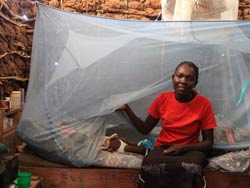Multilateral Initiative on Malaria (MIM) convenes in Kenya
November - December, 2009 | Volume 8, Issue 6

Photo by John-Michael Maas,
Darby Communications
Several thousand researchers, health workers and
policy makers met at the fifth Multilateral Initiative on
Malaria (MIM) conference to discuss the latest in
malaria prevention and treatment, including
interventions such as bed nets.
At the fifth Multilateral Initiative on Malaria conference held recently in Nairobi, Kenya, several thousand researchers, health workers and policy makers gathered to discuss the latest in malaria prevention and treatment. The initiative, commonly known as MIM, has become the largest collaboration of malaria experts worldwide.
Key issues regarding malaria drug treatments were explored, including the call for African researchers to subject traditional medicines to stringent scientific testing. Other topics included vaccine testing, affordability of medicines, poor antimalarial drug quality and improving access to artemisinin combination therapy.
Participants also discussed the U.S. President's Malaria Initiative (PMI), including vector control activities and collaborative approaches to scaling up interventions.
It was announced that the University of Yaounde in Cameroon will be the next site of the MIM secretariat, beginning in 2011.
"MIM has brought a lot to African scientists," said Professor Rose Leke, who will chair the secretariat. "We want to build on this in our bilingual country, consolidating MIM achievements as well as expanding into new areas. For example, we would like to help researchers communicate findings better, increase research that provides evidence for healthcare policy, and encourage more Africans to utilize the tools of genomics."
More Information
To view Adobe PDF files,
download current, free accessible plug-ins from Adobe's website.